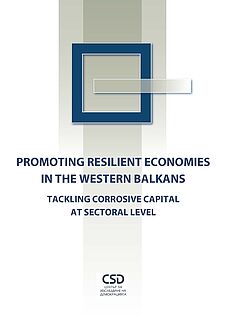Promoting Resilient Economies in the Western Balkans : Tackling Corrosive Capital at Sectoral Level
Promoting Resilient Economies in the Western Balkans : Tackling Corrosive Capital at Sectoral Level
Author(s): Alexander Gerganov, Igor Stojanović, Ana Lučić, Milica Kovačević, Nemanja Todorović Štiplija, Igor Novaković, Danijela Bozovic
Subject(s): Social Sciences, Law, Constitution, Jurisprudence, Criminal Law, Sociology, Criminology, Sociology of Law, Administrative Law
Published by: Център за изследване на демокрацията
Summary/Abstract: The transition process to democracy and market economy in the Western Balkans has been largely incomplete stalling the region’s prospects for EU integration. Rather than building robust government systems based on democracy and rule of law, critical weaknesses - “governance gaps” - remain widespread. As a result, external actors—particularly undemocratic states—have been able to reassert their role in the Western Balkans and undermine democratic development in the region. This has become particularly visible with the effects of the COVID-19 global pandemic, which have also strengthened local authoritarian instincts.
In the current report, CSD, with support from partners in the Western Balkans, builds upon the comprehensive MACPI (Monitoring Anti-Corruption Policy Implementation) methodology, in order to analyse corrosive capital challenges, define regional priorities, and identify potential common patterns in the Western Balkans region. The MACPI assessment was based on extensive desk research, empirical case studies, review of international best practice and sets of interviews with experts, employees and clients of selected public institutions in each of the four target countries – Bosnia and Herzegovina, Montenegro, North Macedonia, and Serbia. The authors recommend that the countries re-examine their bilateral investment treaties and international agreements in terms of potential loopholes, and introduce strong internal policies in the public authorities. The latter should be revised in a way to effectively stop any potential conflict of interest, external corruption pressure, or pressure from above.
- Print-ISBN-13: 978-954-477-406-6
- Page Count: 39
- Publication Year: 2021
- Language: English
- eBook-PDF
- Table of Content
- Introduction

